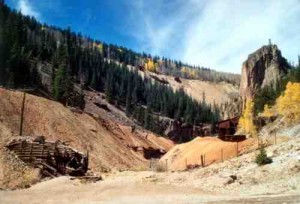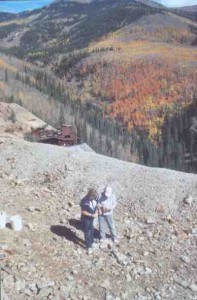Review by Ed Quillen
Christo – July 2006 – Colorado Central Magazine
Rags Over the Arkansas River
Just say no to Christo
30-minute DVD produced by ROAR
No ISBN
THERE ARE GOOD ARGUMENTS to be made against the “Over the River” project proposed by artists Christo and Jeanne-Claude, and some of them appear in this video. But so do some rather lame arguments.
First, though, we need to know what everyone is arguing about. And this video assumes that viewers are quite familiar with the subject. Those who aren’t will have to piece it together.
Christo, most recently known for his “Gates of Central Park” project in New York City, wants to stretch cables across the Arkansas River in various stretches between Salida and Parkdale, then drape the cables with translucent colored panels. The display would last for two weeks in some future August, but construction (the cables will need to be secured on concrete mounts) could take two or three years. About 250,000 visitors are expected.
If someone had just said that, and displayed a rendition and a map, then Rags Over the Arkansas River (the name of the video, as well as of the opposition group that produced it) would offer a more complete presentation.
This video consists of a series of statements by opponents, most (perhaps all) of them area residents. The segments are not interviews, and the camera seldom wanders away from their faces. They stand there and tell us what they don’t like about Christo’s Over the River project.
The most sensible arguments come from people like Dan Ainsworth of the Tallahassee Volunteer Fire Department, when he explains how a crowd in the canyon could seriously delay emergency access, and how some rural Fremont County residents depend on deliveries for their drinking water.
However, he seems to be stretching when he says that 50% of the fresh produce from the Western Slope, at mid-August harvest time, goes to market on U.S. 50, and thus drivers who dally to look at the curtains will delay produce deliveries.
Since U.S. 50 is winding and slow, and I-70 is a shorter and faster route to Denver anyway, I find it hard to believe that 50% of Grand Junction’s peaches, Paonia’s apples, and Olathe’s sweet corn would take Highway 50. But even if it’s true, drivers could still use U.S. 50 as far as Poncha Springs, then get to Colorado Springs in almost the same time by taking U.S 285 and U.S. 24.
Ainsworth could be right, and perhaps the project is also expected to cause congestion on U.S. 285 and U.S. 24 — but if so, the producer should have gotten Ainsworth to buttress his claims. When he doesn’t, it raises questions, and those questions hurt the credibility of the entire video.
And that’s the biggest problem with this video. The objections aired frequently seem more like speculations than facts. There’s very little included in the way of research, evidence, or queries of experts unaffiliated with the opposition. Although ROAR members include a wide range of objections, one suspects that their case would have been stronger if they’d stuck to their most supportable arguments.
Perhaps the weirdest opposition reasons came from Janice Yalch, presented to us as a geologic authority. The cross-river cables will vibrate in the wind, she said. Those vibrations will transfer to the cable mounts in the banks, which are concrete caissons anchored in bedrock. And so the bedrock will vibrate, creating continuous small seismic events. She doesn’t predict cataclysmic earthquakes as a result, but she said it could aggravate small faults, allowing water to enter them, and thus cause area wells to go dry.
She could be right. But she’d be a lot more credible if she could explain why this didn’t happen a decade ago, when twenty ground-shaking trains a day rumbled through the canyon. Or maybe she believes it did, in which case she should have included the evidence.
Over the River, if constructed, would certainly have some effect on fish and wildlife in the canyon. Ellen Bauder, a research ecologist, raises some good questions, and points out that the disturbances would not be just for the two weeks of formal display, but for several years as Christo’s crews constructed and removed the project.
Carol Neville, a canyon fishing guide, pointed out how the project could affect her livelihood, which is something that she is clearly the authority on, and she also pointed out that anglers come from all over to enjoy a scenic brown trout fishery, not colored curtains. But her presentation would have been more effective if she hadn’t been standing in the water as she told us that every step into the water disturbed the fishery.
The clearest and most coherent opposition came from Cathey Young, a ROAR founder, as she explained how area residents who need home medical care, or frequent visits to Cañon and Salida for things like dialysis, would be threatened by auto congestion.
She also proposed an alternative that sounded sensible to me: put the drapes in the Royal Gorge. Nobody lives there, it would affect no one’s access to vital goods or services, and people could observe from the train. Christo ought to explain why that wouldn’t work.
The ROAR video makes some good arguments against the Christo project. It also makes some that deserve more explication to demonstrate their validity, and some that just seem preposterous. It’s not flashy; mostly it’s just people talking to you. Its production values are uneven — sometimes the sound level fluctuated so much it was an annoyance, and we had to try a couple of different DVDs on several different devices before we could get one to play through without stuttering or halting.
But this is an earnest contribution to the discussion on a hot local issue, which argues its case without any shouting or name-calling or ad hominem statements. In other words, it has civil arguments, and no matter which side you’re on, or if you’re still trying to decide, it’s something you should see.
The ROAR DVD is available at the Salida Regional Library, or with a $10 donation to ROAR, P.O. Box 786, Cañon City CO 81215.


